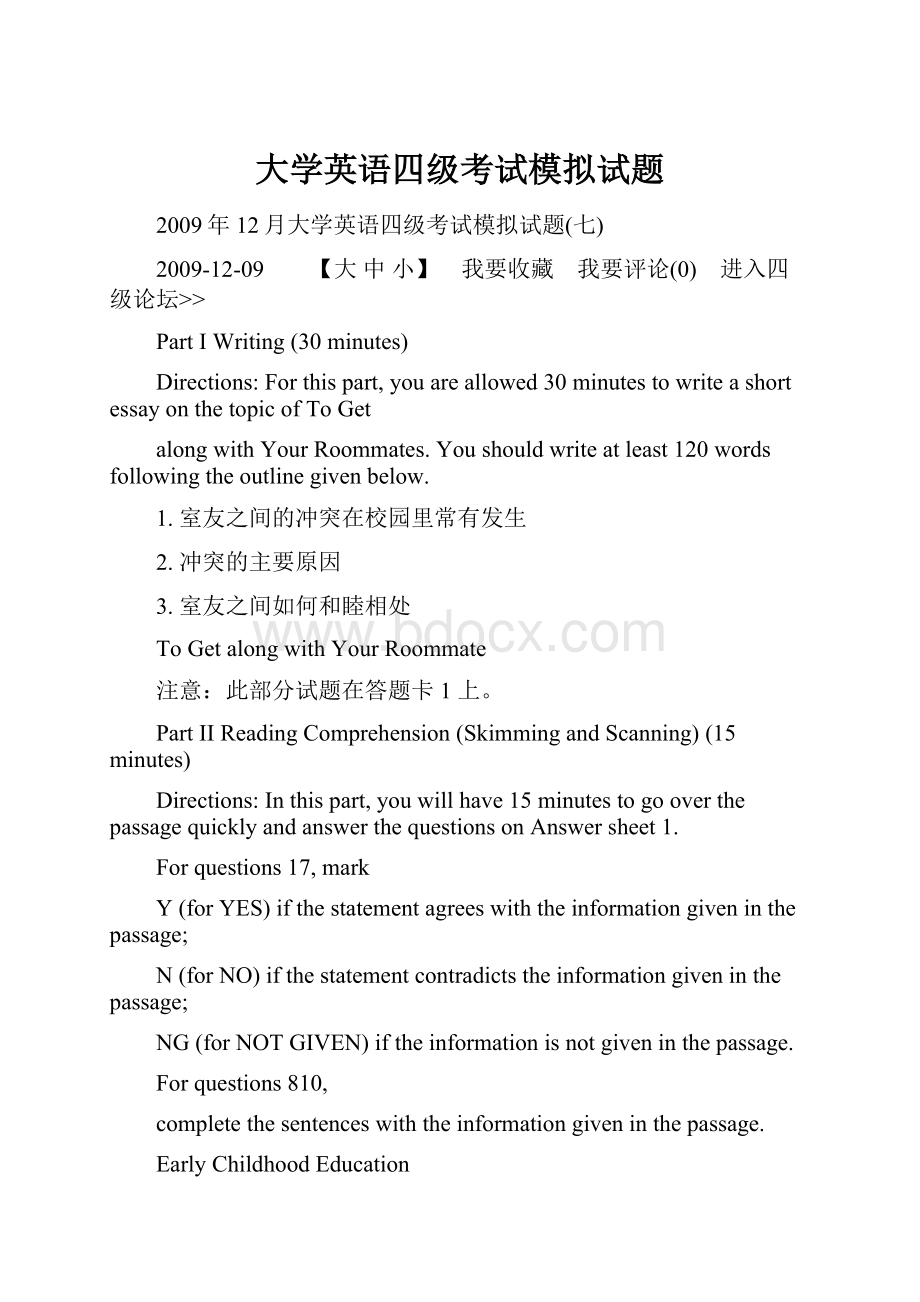大学英语四级考试模拟试题.docx
《大学英语四级考试模拟试题.docx》由会员分享,可在线阅读,更多相关《大学英语四级考试模拟试题.docx(20页珍藏版)》请在冰豆网上搜索。

大学英语四级考试模拟试题
2009年12月大学英语四级考试模拟试题(七)
2009-12-09 【大中小】 我要收藏 我要评论(0) 进入四级论坛>>
PartIWriting(30minutes)
Directions:
Forthispart,youareallowed30minutestowriteashortessayonthetopicofToGet
alongwithYourRoommates.Youshouldwriteatleast120wordsfollowingtheoutlinegivenbelow.
1.室友之间的冲突在校园里常有发生
2.冲突的主要原因
3.室友之间如何和睦相处
ToGetalongwithYourRoommate
注意:
此部分试题在答题卡1上。
PartIIReadingComprehension(SkimmingandScanning)(15minutes)
Directions:
Inthispart,youwillhave15minutestogooverthepassagequicklyandanswerthequestionsonAnswersheet1.
Forquestions17,mark
Y(forYES)ifthestatementagreeswiththeinformationgiveninthepassage;
N(forNO)ifthestatementcontradictstheinformationgiveninthepassage;
NG(forNOTGIVEN)iftheinformationisnotgiveninthepassage.
Forquestions810,
completethesentenceswiththeinformationgiveninthepassage.
EarlyChildhoodEducation
‘EducationToBeMore’waspublishedlastAugust.ItwasthereportoftheNewZealand
Government’sEarlyChildhoodCareandEducationWorkingGroup.Thereportarguedforenhancedequity(公平)ofaccessandbetterfundingforchildcareandearlychildhoodeducationinstitutions.Unquestionably,that’sarealneed;butsinceparentsdon’tnormallysendchildrentopreschoolsuntiltheageofthree,arewemissingoutonthemostimportantyearsofall?
A13yearstudyofearlychildhooddevelopmentatHarvardUniversityhasshownthat,bytheageofthree,mostchildrenhavethepotentialtounderstandabout1000words–mostofthelanguagetheywilluseinordinaryconversationfortherestoftheirlives.
Furthermore,researchhasshownthatwhileeverychildisbornwithanaturalcuriosity,itcanbesuppresseddramaticallyduringthesecondandthirdyearsoflife.Researchersclaimthatthehumanpersonalityisformedduringthefirsttwoyearsoflife,andduringthefirstthreeyearschildrenlearnthebasicskillstheywilluseinalltheirlaterlearningbothathomeandatschool.
Onceovertheageofthree,childrencontinuetoexpandonexistingknowledgeoftheworld.Itisgenerallyacknowledgedthatyoungpeoplefrompoorersocioeconomicbackgroundstendtodolesswellinoureducationsystem.That’sobservednotjustinNewZealand,butalsoin
Australia,BritainandAmerica.Inanattempttoovercomethateducationalunderachievement,anationwideprogramcalled‘Headstart’waslaunchedintheUnitedStatesin1965.Alotofmoneywaspouredintoit.Ittookchildrenintopreschoolinstitutionsattheageofthreeandwassupposedtohelpthechildrenofpoorerfamiliessucceedinschool.
Despitesubstantialfunding,resultshavebeendisappointing.Itisthoughtthattherearetwoexplanationsforthis.First,theprogrambegantoolate.Manychildrenwhoentereditattheageof
threewerealreadybehindtheirpeersinlanguageandmeasurableintelligence.Second,theparentswerenotinvolved.Attheendofeachday,‘Headstart’childrenreturnedtothesamedisadvantagedhomeenvironment.
Asaresultofthegrowingresearchevidenceoftheimportanceofthefirstthreeyearsofachild’slifeandthedisappointingresultsfrom‘Headstart’,apilotprogramwaslaunchedin
MissouriintheUSthatfocusedonparentsasthechild’sfirstteachers.The‘Missouri’programwaspredicatedonresearchshowingthatworkingwiththefamily,ratherthanbypassingtheparents,isthemosteffectivewayofhelpingchildrengetofftothebestpossiblestartinlife.Thefouryearpilotstudyincluded380familieswhowereabouttohavetheirfirstchildandwhorepresentedacrosssectionofsocioeconomicstatus,ageandfamilyconfigurations(结构).Theyincludedsingleparentandtwoparentfamilies,familiesinwhichbothparentsworked,andfamilieswitheitherthemotherorfatherathome.Theprograminvolvedtrainedparenteducatorsvisitingtheparents’homeandworkingwiththeparent,orparents,andthechild.Informationonchilddevelopment,andguidanceonthingstolookforandexpectasthechildgrowswereprovided,plusguidanceinfosteringthechild’sintellectual,language,socialandmotorskilldevelopment.Periodiccheckupsofthechild’seducationalandsensorydevelopment(hearingandvision)weremadetodetectpossiblehandicapsthatinterferewithgrowthanddevelopment.Medicalproblemswerereferredtoprofessionals.
Parenteducators
madepersonalvisitstohomesandmonthlygroupmeetingswereheldwithothernewparentstoshareexperienceanddiscusstopicsofinterest.Parentresourcecenters,locatedinschoolbuildings,offeredlearningmaterialsforfamiliesandfacilitiesforchild.
Attheageofthree,thechildrenwhohadbeeninvolvedinthe‘Missouri’programwereevaluatedalongsideacrosssectionofchildrenselectedfromthesamerangeofsocioeconomicbackgroundsandfamilysituations,andalsoarandomsampleofchildrenthatage.Theresultswerephenomenal.Bytheageofthree,thechildrenintheprogramweresignificantlymoreadvancedinlanguagedevelopmentthantheirpeers,hadmadegreaterstridesinproblemsolvingandotherintellectualskills,andwerefurtheralonginsocialdevelopment.Infact,theaveragechildontheprogramwasperformingatthelevelofthetop15to20percentoftheirpeersinsuchthingsasauditorycomprehension,verbalabilityandlanguageability.
Mostimportantofall,thetraditionalmeasuresof‘risk’,suchasparents’ageandeducation,orwhethertheywereasingleparent,borelittleornorelationshiptothemeasuresofachievement
andlanguagedevelopment.Childrenintheprogramperformedequallywellregardlessofsocioeconomicdisadvantages.Childabusewasvirtuallyeliminated.Theonefactorthatwasfoundtoaffectthechild’sdevelopmentwasfamilystressleadingtoapoorqualityofparentchildinteraction.Thatinteractionwasnotnecessarilybadinpoorerfamilies.
Theseresearchfindingsareexciting.ThereisgrowingevidenceinNewZealandthatchildrenfrompoorersocioeconomicbackgroundsarearrivingatschoollesswelldevelopedandthatour
schoolsystemtendstoperpetuate(使永存)thatdisadvantage.Theinitiativeoutlinedabovecouldbreakthatcycleofdisadvantage.Theconceptofworkingwithparentsintheirhomes,orattheirplaceofwork,contrastsquitemarkedlywiththereportoftheEarlyChildhoodCareandEducation
WorkingGroup.Theirfocusisongettingchildrenandmothersaccesstochildcareandinstitutionalizedearlychildhoodeducation.Educationfromtheageofthreetofiveisundoubtedlyvital,butwithoutasimilarfocusonparenteducationandonthevitalimportanceofthefirstthreeyears,someevidenceindicatesthatitwillnotbeenoughtoovercomeeducationalinequity.
1.Theskillslearnedbychildrenatageofthreewillbeusedinalltheirlaterlearninginlife.
2.The‘Headstart’programfinallysucceededinitsaim.
3.The‘Missour’programsuppliedmanyformsofsupportandtrainingtoparents.
4.Most‘Missouri’programthreeyearoldsscoredhighlyinareassuchaslistening,speaking,reasoningandinteractingwithothers.
5.‘Missouri’programchildrenofyoung,uneducated,singleparentsscoredlesshighlyonthetests.
6.Thericherfamiliesinthe‘Missouri’programhadhigherstresslevels.
7.Educationalinequitycannotbeovercomeforchildrenfromdifferentfamilybackgrounds.
8.Theaimof‘Headstart’programistohelpchildrenfrompoorfamiliesovercome____________________.
9.Themosteffectivewayofhelpingchildrengetofftothebestpossiblestartinlifeis____________________.
10.TheconceptofworkingwithparentsintheirhomescontrastsquitemarkedlywiththereportoftheEarlyChildhoodCoreand____________________.
PartIIIListeningComprehension(35minutes)
SectionA
Directions:
Inthissection,youwillhear8shortconversationsand2longconversations.Attheendofeachconversation,oneormorequestionswillbeaskedaboutwhatwassaid.Boththeconversationandthequestionswillbespokenonlyonce.Aftereachsectiontherewillbeapause.Duringthepause,youmustreadthefourchoicesmarkedA),B),C)andD),anddecidewhichisthebestanswer.ThenmarkthecorrespondingletteronAnswerSheet2withasinglelinethroughthecentre.
11.A)ToordersomemedicineforAuntMargaret.
B)Togetsomeexercise.
C)Tobuysomeitems.
D)Toseetheiraunt.
12.A)Anyonecandoit.
B)Noonecandoit.
C)Alexcanprobablydoit.
D)Alexprobablyshouldn’tdoit.
13.A)Teaisbetterthancoffee.
B)Themanshouldswitchtotea.
C)Therearetworeasonsnottodrinkcoffee.
D)Themanshouldn’tdrinkeither.
14.A)Atahairdresser’s.B)Atatailor’s.
C)Atabutcher’s.D)Ataphotographer’s.
15.A)Angry.B)Tired.C)Hungry.D)Disappointed.
16.A)Shewouldlikesomesoup.
B)She’sinvitingthemantolunch.
C)Shewantstoknowifthemanlikeschicken.
D)Sheatelunchearlier.
17.A)Veryfewpeoplecometoit.
B)Agoodnamehasn’tbeenfoundforit.
C)Peopledon’tlikeclimbingthestairstogetthere.
D)Shehasdecidedtophonetheticketoffice.
18.A)Itwasdesignedbymodernartists.
B)Itwillcolorblackandwhiteprints.
C)Itsmerchandisemustbecarefullysortedthrough.
D)Itsbestselectionisofmodernartprints.
Questions19to22arebasedontheconversationyouhavejustheard.
19.A)Aclasspresentationthey’repreparing.
B)Atelevisionprogramthemaniswatching.
C)Visitingaclosefiendoftheirs.
D)Studyingforatest.
20.A)He’stakingabreakfromstudying.
B)Hehasalreadyfinishedstudying.
C)Hewasassignedtowatchaprogrambyhisprofessor.
D)He’sfindingoutsomeinformationforafriend.
21.A)Hedidn’tknowthatshewasenrolledinamathematic